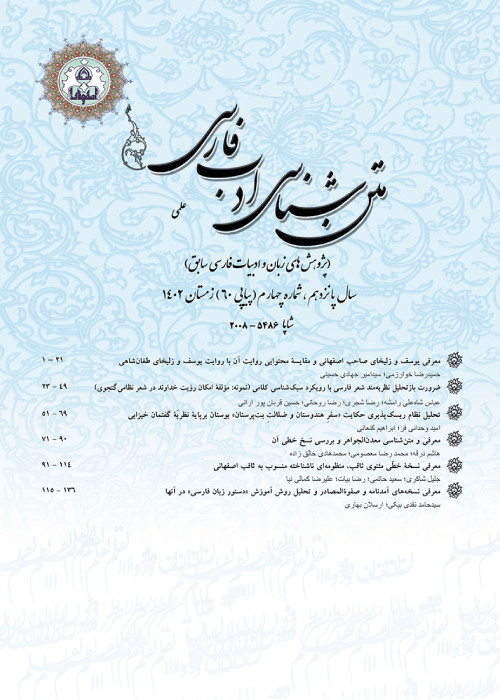Teb Tengri or Bote Tangri?Analysis of the Variations of a Word and the Transformations of its Historical Narratives from China to Iran
With the Mongol invasion of Iran, many of their words entered the Persian language. One of these words or compounds is "Teb tengri" which has been used in various texts as Bot Tengri. In this study, we use the descriptive-analytical method and corpus stylistics (especially in the analysis of mentioned narration) to analyze “tengri” and “teb/bot tengri” especially in Mongolian and Chinese languages and the narrations related to these words. Then, we show that the first part of this word combination should be read as "teb", which in the Mongolian language is a prefix that means exaggeration and it can be seen in other words. The combination of "teb Tangri" is known as the special title of one of the Shamans with whom Genghis Khan strengthened the foundations of his power. When he seeks his share of power, he was killed by Genghis Khan. It can be said that among the Persian historical texts, the Vassaf’s history has presented a narration with the most elements related to the beliefs of the Shamans.Introduction The Mongol invasion, along with its very destructive effects, led to various exchanges, including cultural exchanges between East and West. From a stylistic point of view, the cultural effects of this incident are manifested in the first place in linguistic structures that are not normally separated from intellectual structures, especially in words and lexical structures. One of the salient effects of the Mongol invasion was the spread of the Turkish language, especially Mongol Turk, more than was common in the sixth century. Thus, some words found in Persian became so common that they are still used today.Among such words, the word "Tengri" can be mentioned This word, which has been used in some texts before this period, is not very problematic in terms of meaning. With the same structure, there is no special semantic ambiguity, but this word is combined with another part, which is the first part. It has been recorded in Persian texts in various forms, such as "Teb/Bot tengri", "TebetTengri" and "Teb". In addition, the exact pronunciation the word is not found in dictionaries. In addition to pronounce this structure, the narratives themselves have used "Teb Tengri or Bot Tengri" which are disturbed or repetitive.In this study, while paying attention to the readings of this word and its correct pronounciation, we have studied the first part of the composition and criticized its various forms according to some sources in Mongolian and Chinese. We have also examined the narrations that deal with the story of "Teb Tengri/Bot" in the form of historical figures, and have shown their metamorphoses.Materials and Methods Using a descriptive-analytical method, the present study first examines the composition of "Teb Tengri or Bot Tengri" in Chinese and Mongolian texts from the perspective of phonetic and lexical structure. It then analyzes its application in various texts of Persian prose and poetry. Finally, it reviews and criticizes the narration related to this structure in six texts of Persian prose.Discussion of Results and Conclusions In the famous book of Mongolian grammar, there are grammatical rules for some Mongolian words, which by exaggerating the teb (teb) as a prefix, the meaning of the word is exaggerated. In other words, the function of the prefix "teb" is to exaggerate the meaning. The "Teb" section in the word "Teb Tengri" is also subject to the same rule, which can be translated as "divine" or "drowning in God". Of course, the literal translation of Teb Tengri, according to the structural rules of the Mongolian language, can be considered a very wide and deep sky. In other words, the combination of "Teb Tengri", which is one of the two components of "Teb" for exaggeration in the Mongolian language, and "Tengri" meaning God and collectively meaning "immersed in God", in Persian texts is often referred to as "Tengri Bot". Based on linguistic and historical evidence, this usage is completely incorrect. Combining various texts, it can be said that the combination of "Tengri Teb" was the title for one of the famous Mongol shamans who was very deceitful and Genghis used his position and of course his deception in his participation in the government structure, with complicity. He draws a heavenly position for himself among the simple-hearted people, and Tengari Teb justifies his actions. But when he sees that Genghis does not involve him in the government and does not give him a share, he opposes him. Eventually, Teb Tengri is killed by Genghis Khan (son, brother, or one of his relatives). Among Persian texts, the narration of the Vassaf's History is considered to be the closest to the main narration due to having most of the features related to shamans.
- حق عضویت دریافتی صرف حمایت از نشریات عضو و نگهداری، تکمیل و توسعه مگیران میشود.
- پرداخت حق اشتراک و دانلود مقالات اجازه بازنشر آن در سایر رسانههای چاپی و دیجیتال را به کاربر نمیدهد.



